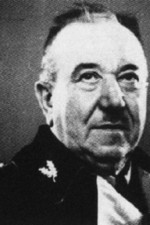Karl Wiligut
| Surname | Wiligut |
| Given Name | Karl |
| Born | 10 Dec 1866 |
| Died | 3 Jan 1946 |
| Country | Austria, Germany |
| Category | Other |
| Gender | Male |
Contributor: C. Peter Chen
ww2dbaseKarl Maria Wiligut was born in Vienna, Austria-Hungary in 1866. His father was of the Roman Catholic faith, but was also a follower of the German völkisch movement; this would play a role in his later life. He attended a military academy between 1880 and 1883, and then he would be conscripted into the Austro-Hungarian Army, serving with as an infantryman in Serbia. In 1889, he joined the Schlaraffia-Loge society. In 1903, he published his first book, Seyfrieds Runen, a collection of stories and lores surrounding ancient Germanic runes, under the pen name Karl Maria Wiligut Lobesam. In 1906, he married Malwine Leuts von Teuringen from Bozen, Austria-Hungary (now Bolzano, Italy); they would have one boy and two girls, but the boy would die in infancy. In 1908, he published his second book, Neun Gebote Gots, on Irminism. It was around this time he began preaching that he was a direct descendent of ancient god-kings, and the death of his boy doubly saddened him, as he had lost his male heir. During WW1, he served with 30th Infantry Regiment in the Carpathian Mountains, commanded a training unit near Salzburg in Austria-Hungary, and finally commanded a convalescent camp near Lemburg, Austria-Hungary (now Lviv, Ukraine); he would be promoted to the rank of colonel by the end of the war. Shortly after WW1, he and his family moved to Morzg near Salzburg, Austria, where he devoted his efforts to his study of mysticism. His wife did not believe in his claims to royal lineage, and he slowly became physically abusive toward her, ultimately leading to him being kept in a mental hospital between Nov 1924 and 1927. His family finally broke apart in 1932 when his wife moved to München (Munich), Germany.
ww2dbaseIn Jan 1933, Wiligut met Heinrich Himmler, who had an interest in the occult, and the two found each other to be like-minded. Wiligut joined Himmler's Schutzstaffel (SS) organization under the pseudonym Karl Maria Weisthor ("Thor Knows") in Sep 1933. Two months later accompanied Himmler to inspect the castle Schloß Wewelsburg near Paderborn, Germany; this castle, chosen because of the legend of the Battle at the Birch Tree and the nearby Externsteine stone formation, would later become the "SS Black Camelot". In Apr 1934, Wiligut was given the rank of Standartenführer, which was the SS equivalent of his colonel rank. He was soon made the head of the Department of Ancient and Prehistory at the Race and Resettlement Main Office (RuSHA). In Oct 1934, he was made the head of Section VIII (Archives) of RuSHA. In Nov 1934, he was promoted to the rank of SS-Oberführer. In the spring of 1935, he was transferred to Berlin, Germany to join Himmler's personal staff. In Sep 1936, he was promoted to the rank of SS-Brigadeführer. Having convinced Himmler that Irminism was the religion of ancient Germanic peoples and thus the one true religion, Wiligut's philosophy began to weigh weigh heavily in the occult practices of the SS. In Nov 1938, however, SS deputy chief Karl Wolff discovered his 1924 mental hospital commitment and used it to maneuver him into retirement, which took place in Feb 1939 (his retirement would not be made official until Aug 1939). Although his philosophies would continue to form the core of the occult practices of the SS organization through 1945, he would have no further input. He moved to Aufkirchen in southern Germany in 1939, Goslar in central Germany in 1940, and Wörthersee in southern Austria in 1943. SS clerk Elsa Baltrusch was ostensibly assigned as his assistant, but in actuality she was assigned to keep an eye on him.
ww2dbaseAfter the war, Wiligut moved to a refugee camp near Velden am Wörther See in southern Austria, where he suffered a stroke. After a brief stay in Salzburg, he moved to Arolsen in central Germany, where he would pass away in Jan 1946.
ww2dbaseSources:
Bill Yenne, Hitler's Master of the Dark Arts
Wikipedia
Last Major Revision: Jan 2014
Photographs
 |
Karl Wiligut Timeline
| 10 Dec 1866 | Karl Wiligut was born in Vienna, Austria-Hungary. |
| 17 Dec 1883 | Karl Wiligut became an infantryman in the Austro-Hungarian Army. |
| 21 Dec 1883 | Karl Wiligut was promoted to the rank of private. |
| 1 Aug 1917 | Karl Wiligut was promoted to the rank of colonel. |
| 1 Jan 1919 | Karl Wiligut retired from military service. |
| 29 Nov 1924 | Karl Wiligut was arrested by the police in Austria and was taken to a mental hospital, where he would be diagnosed with schizophrenia. |
| 28 Aug 1939 | Karl Wiligut was officially placed on the SS retired list; in actuality he had been pushed out of his office since Feb 1939. |
| 3 Jan 1946 | Karl Wiligut passed away in Arolsen, Germany. |
Please consider supporting us on Patreon. Even $1 per month will go a long way! Thank you. Please help us spread the word: Stay updated with WW2DB: |
» Hitler's Master of the Dark Arts
- » 1,169 biographies
- » 337 events
- » 44,835 timeline entries
- » 1,244 ships
- » 350 aircraft models
- » 207 vehicle models
- » 376 weapon models
- » 123 historical documents
- » 261 facilities
- » 470 book reviews
- » 28,517 photos
- » 365 maps
Captain Henry P. Jim Crowe, Guadalcanal, 13 Jan 1943